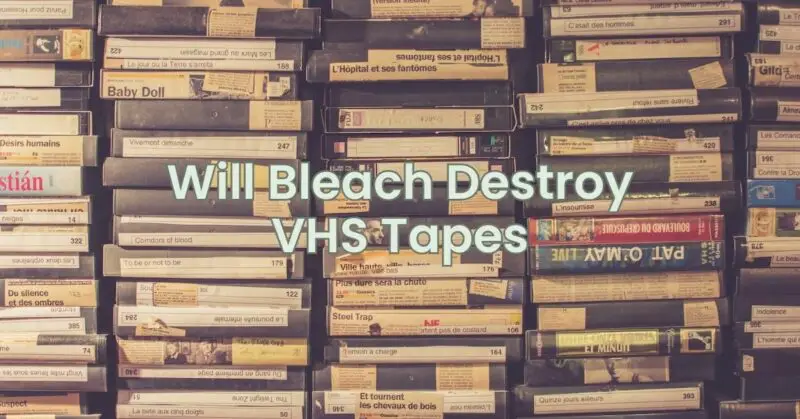VHS tapes hold cherished memories, captured moments, and nostalgic recordings that many people still hold dear. However, as technology advances and formats evolve, questions often arise regarding the impact of certain substances, such as bleach, on VHS tapes. In this article, we will delve into the effects of bleach on VHS tapes and provide insights into why it is crucial to exercise caution when handling these fragile analog treasures.
- Chemical Reaction with Tape Materials: Bleach is a powerful chemical agent that is primarily used as a disinfectant and stain remover. When it comes into contact with the delicate materials of a VHS tape, it can cause irreversible damage:
a. Tape Composition: VHS tapes consist of several layers, including the magnetic tape, binder, and protective coating. Bleach can chemically react with these layers, leading to deterioration, discoloration, and loss of integrity.
b. Oxidation and Degradation: The chemical reaction between bleach and the tape materials can result in oxidation and degradation. This can cause the magnetic particles to detach from the tape, resulting in loss of recorded content and compromised playback quality.
- Discoloration and Loss of Visual Information: One of the most visible effects of bleach on VHS tapes is the discoloration and loss of visual information:
a. Staining: Bleach can cause unsightly stains and discoloration on the tape’s surface. This staining can obscure recorded content, making it difficult or impossible to view.
b. Fading: The chemical reaction with bleach can cause the colors on the tape to fade or completely disappear, leading to a loss of visual detail and fidelity.
- Deterioration of Magnetic Information: Bleach’s corrosive properties can affect the magnetic information stored on VHS tapes:
a. Loss of Magnetic Signal: The chemical reaction with bleach can damage the magnetic particles on the tape, resulting in a weakened or complete loss of the magnetic signal. This leads to significant degradation of the audio and video playback quality.
b. Tracking and Playback Issues: Bleach-induced damage can cause tracking problems during playback, resulting in distorted or unstable video and audio signals.
- Proper Handling and Cleaning: To preserve the integrity of VHS tapes and ensure their longevity, it is essential to handle and clean them properly:
a. Avoid Exposure: Keep VHS tapes away from any household cleaning products, including bleach. Store them in a cool, dry, and dust-free environment to minimize the risk of accidental exposure.
b. Gentle Cleaning Methods: If a VHS tape requires cleaning, use a soft, lint-free cloth or a VCR head-cleaning cassette specifically designed for tape maintenance. Follow the manufacturer’s instructions and avoid using any harsh chemicals or abrasive materials.
Conclusion: Bleach is a potent chemical agent that can cause severe damage to VHS tapes. The chemical reaction between bleach and the delicate tape materials can result in discoloration, loss of visual information, deterioration of magnetic signals, and playback issues. To preserve your VHS tapes and protect their content, it is crucial to handle them with care, avoid exposure to bleach or other harsh chemicals, and adhere to proper cleaning methods.
Remember, VHS tapes are fragile analog treasures that hold precious memories and irreplaceable recordings. Treat them with respect, ensure their proper storage, and embrace the nostalgia and joy they bring as you relive the analog era of home video entertainment.


